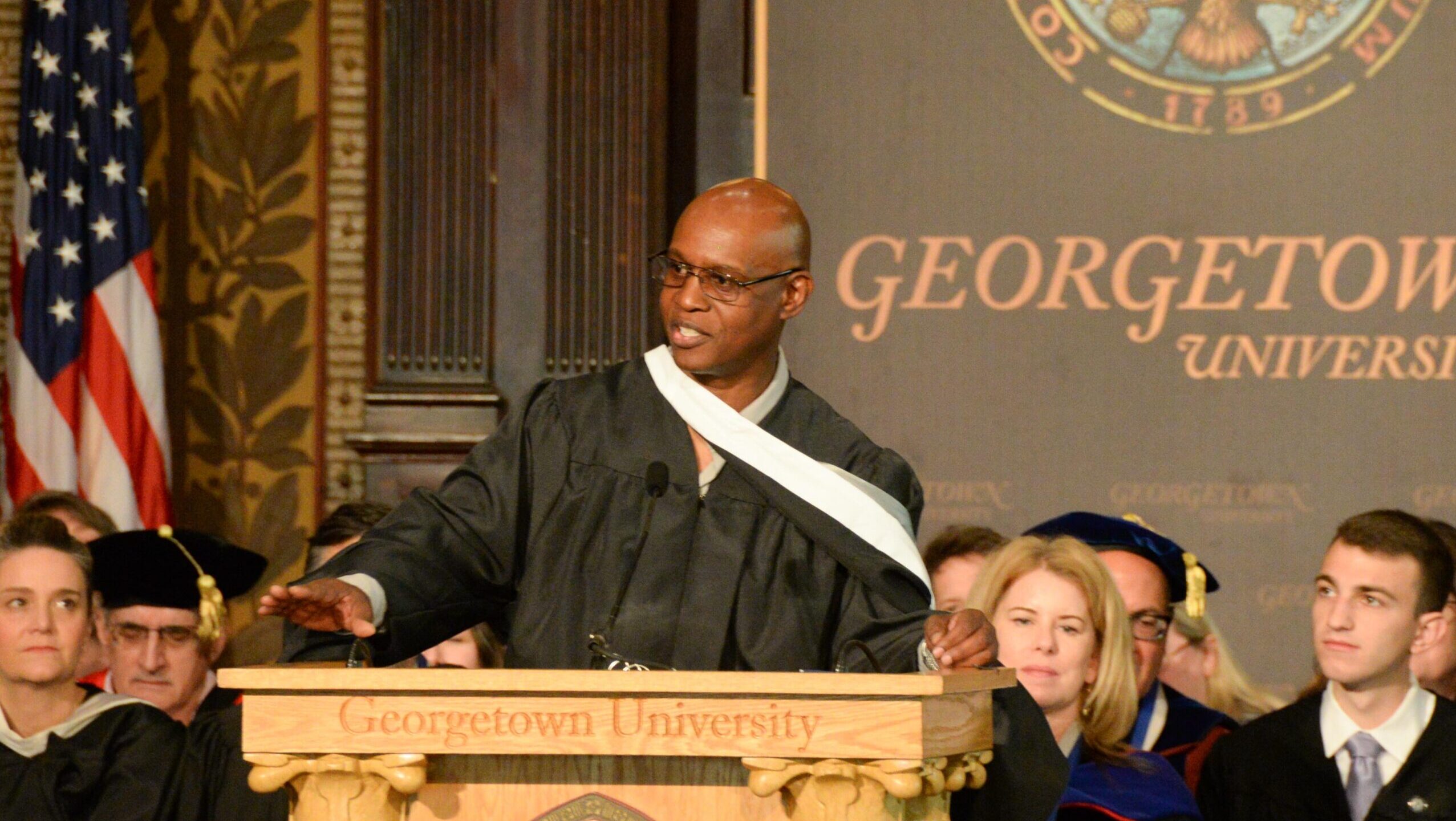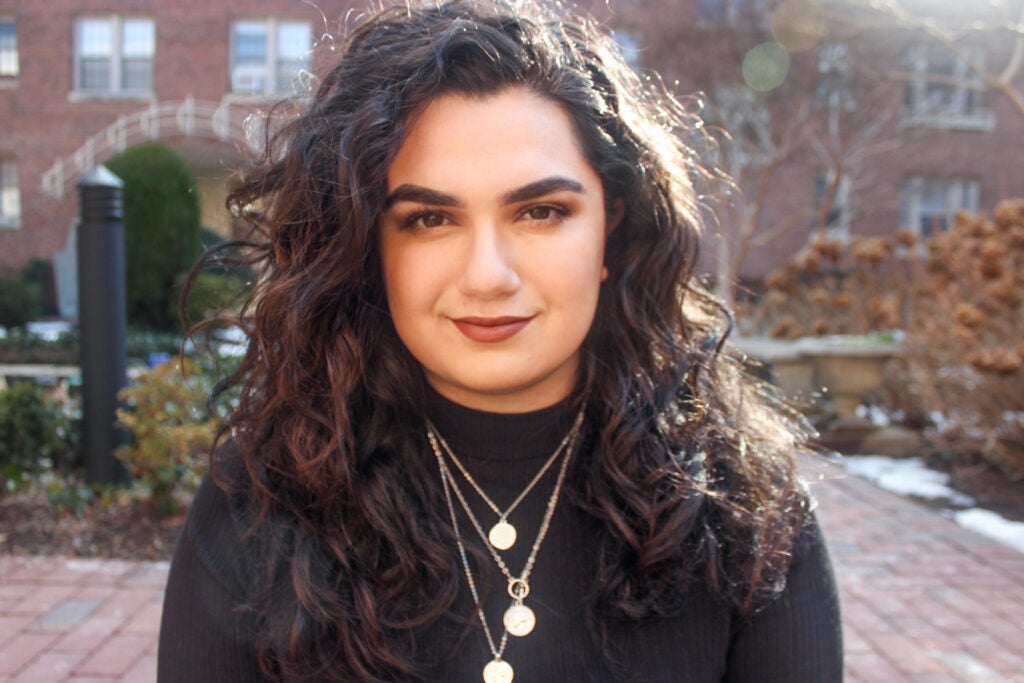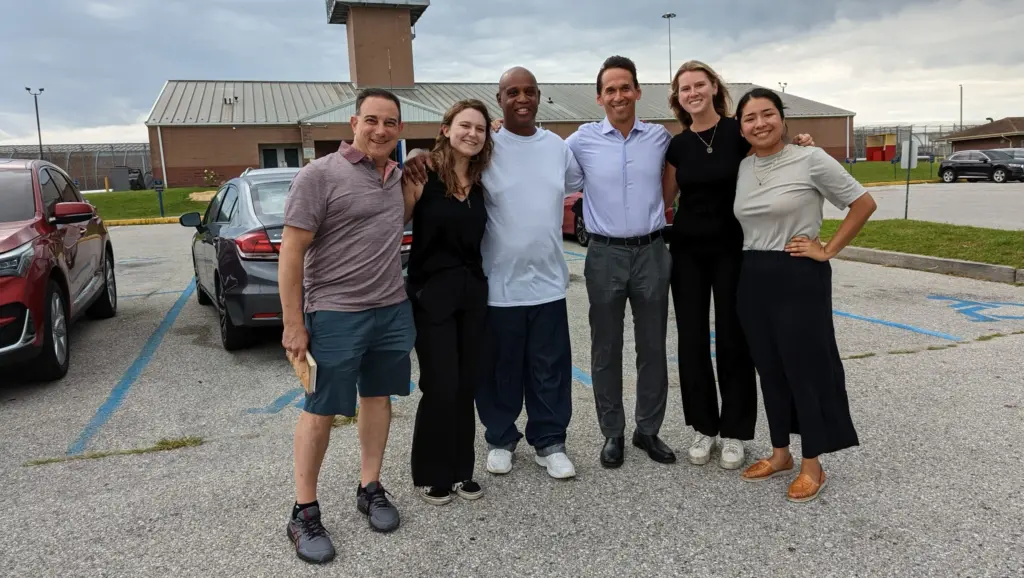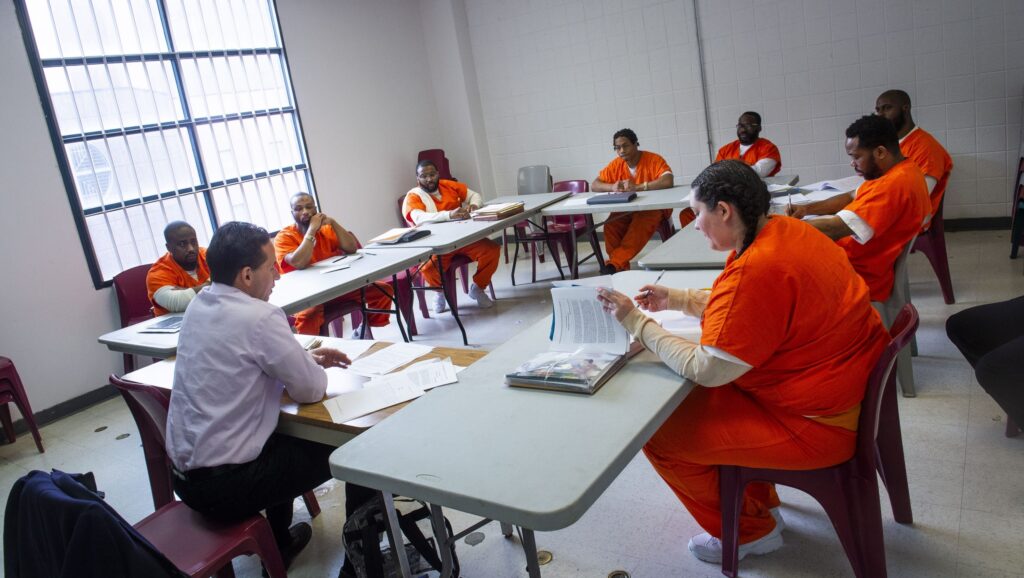The College of Arts & Sciences Honors 2023 Tropaia Award Winners
The Georgetown University College of Arts & Sciences gathered in historic Gaston Hall to honor exceptional graduating seniors and outstanding faculty members at the 104th annual Tropaia Exercises.
The awards ceremony, which takes its name from the ancient Greek word for trophy, honors graduating seniors for their outstanding accomplishments, both within and outside of the classroom. This year, Alanna Cronk (C’23) was awarded the Coakley Medal, Alisa Colon (C’23) the Kraft Medal and Sam Telesa (C’23) the Louis McCahill Award. Amira Ali (C’23) delivered the Cohonguroton Address.
Alanna Cronk
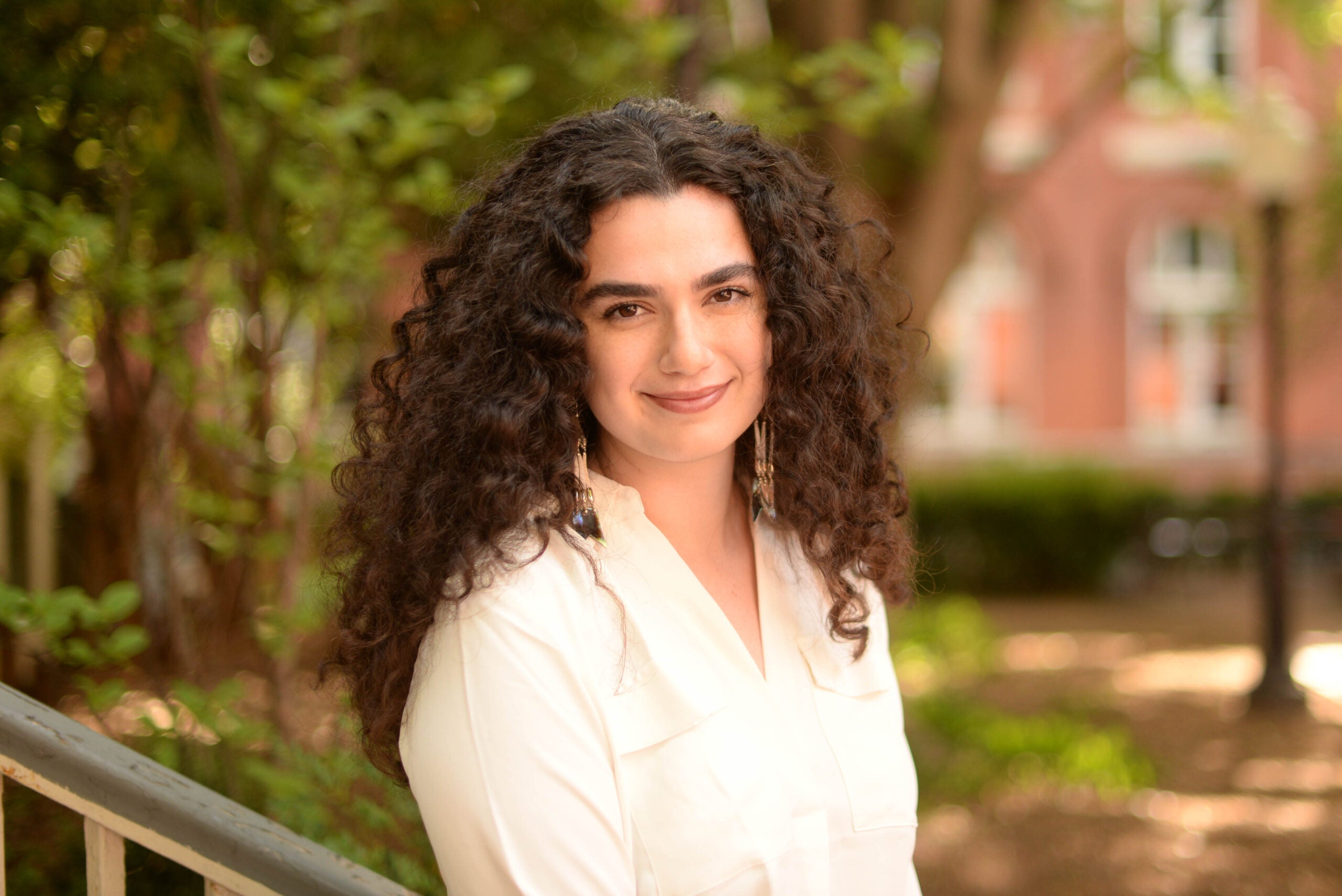
Alanna Cronk, who is Ventureño Chumash, received the Coakley Medal, which is awarded annually to the College of Arts & Sciences senior who, in the opinion of the faculty, most embodies the “qualities of loving service, honor and courage in all phases of their college life.”
Cronk, a philosophy major with minors in English and public health, has been active on campus since arriving as a transfer student from Chapman University just two years ago. In that time, she has received a multitude of accolades, including the Ryan Medal, bestowed by the Department of Philosophy; the Hypatia Diversity Prize, awarded by the academic journal Hypatia; the Penner Research Award, given through the Office of the Provost and the G+JI Fellowship, awarded by the Gender Justice Initiative.
Cronk recently submitted an honors thesis titled “Community vs. Carcerality: Weaving Logics of Care in Policy and Programs for Indigenous Peoples Experiencing Suicidality.” According to Cronk, she’s been interested in the carcerality of psychiatric care since taking her first disability studies course with Lydia X.Z. Brown, an adjunct lecturer in the Disability Studies Program.
“In my thesis, I wanted to integrate the things I had learned about Indigenous philosophy and the practical knowledge I was gaining in public health,” said Cronk. “As a Ventureño Chumash person, and given that American Indian/Alaska Native peoples have the highest rates of death by suicide, I felt really compelled to spend time breaking down how the medical and legal systems fail to provide equitable care, cause harm while proposing some theoretical and practical solutions in this space.”
She has worked as a research assistant with Shelbi Nahwilet Meissner, an assistant professor in the Department of Philosophy, helping coauthor a paper on federal identity recognition politics and their impact on indigenous and disability communities.
“I do not hesitate when I write that Cronk is the very best student that I have had the opportunity to work with in my career,” wrote Nahwilet Meissner.
In her time on the Hilltop, Cronk also served as a board member of the Circle of Indigenous Students’ Alliance (CISA), where she developed a partnership between the Smithsonian National Museum of Natural History and CISA that allows students to access the museum’s archives.
“I have learned a great deal about myself,” said Cronk of her time at Georgetown. “The incredible resources here allowed me to develop the best parts of myself and challenge myself in ways that made me so much stronger. My time at Georgetown has taught me about the importance of community and developing relationships. The work I have done with the University has always involved collaboration, and working in partnerships always brings together diverse energies that create amazing outcomes.”
Cronk is excited for the next chapter in her life, embracing graduation with the nuanced perspective of a philosophy major.
“Life constantly changes, and I want to move with it,” said Cronk. “I was grateful every day I was here. I take away enormous amounts of appreciation for my brilliant friends, my incredible Professors, the gorgeous land around campus and, of course, the warm memories of late-night Wisey’s runs.”
The Coakley medal was established in memory of Henry “Hank” Coakley, a Georgetown alumnus and U.S. Air Force pilot, by his wife, Elizabeth Coakley.
Alisa Colon
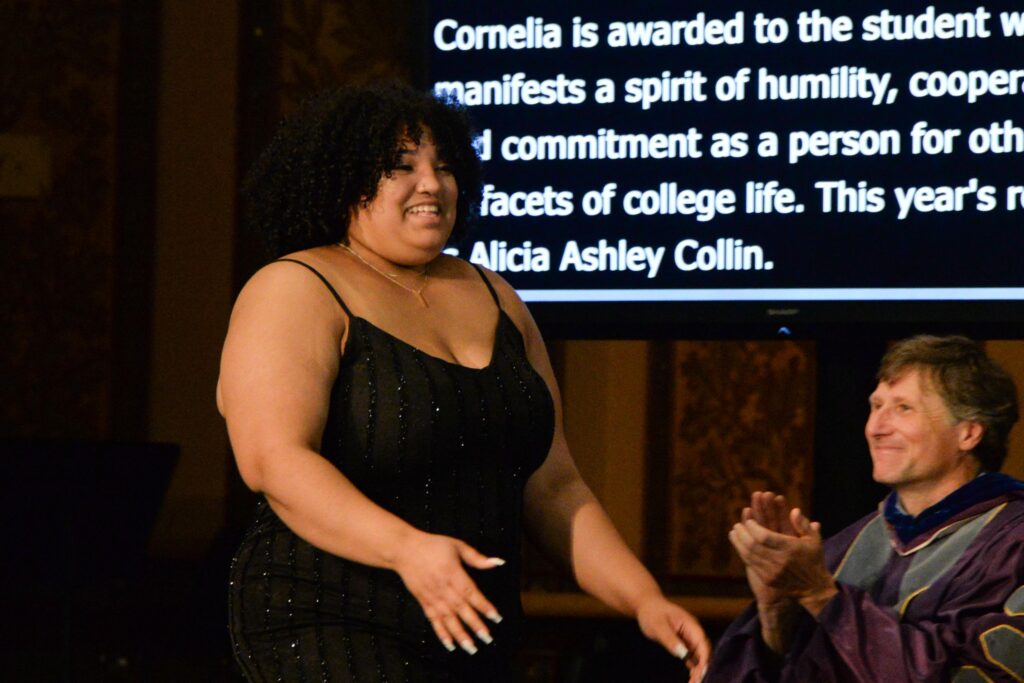
Alisa Colon received the Kraft Medal, given to the graduating student who embodies a “spirit of humility, cooperation and commitment as a woman or man for others in all facets of college life.”
Originally from the Boston area, Colon has made the most of her time on the Hilltop, majoring in justice and peace studies and minoring in women’s and gender studies. Colon worked as a teaching assistant for Amanda Phillips, an associate professor in the Department of English, with whom she took several classes.
“Ms. Colon distinguished herself as an insightful reader, thoughtful interlocutor and creative thinker,” said Phillips. “She has a real talent for unpacking difficult theoretical texts and translating them into colloquial language for her peers.”
Outside of the classroom, Colon has been consistently active and engaged. She co-founded the Black Survivors Coalition, a student-run organization dedicated to empowering sexual assault survivors. She also served as a student representative on the Main Campus Core Curriculum Committee’s Engaging Diversity Revision Subcommittee and as the vice president of programming for the Interhall Council. Last summer, Colon interned with PwC through a program focused on nonprofit consulting.
The Kraft Medal was established by Mrs. Cornerlia Kraft McKee in memory of her mother, Katherine Kraft.
Sam Telesa
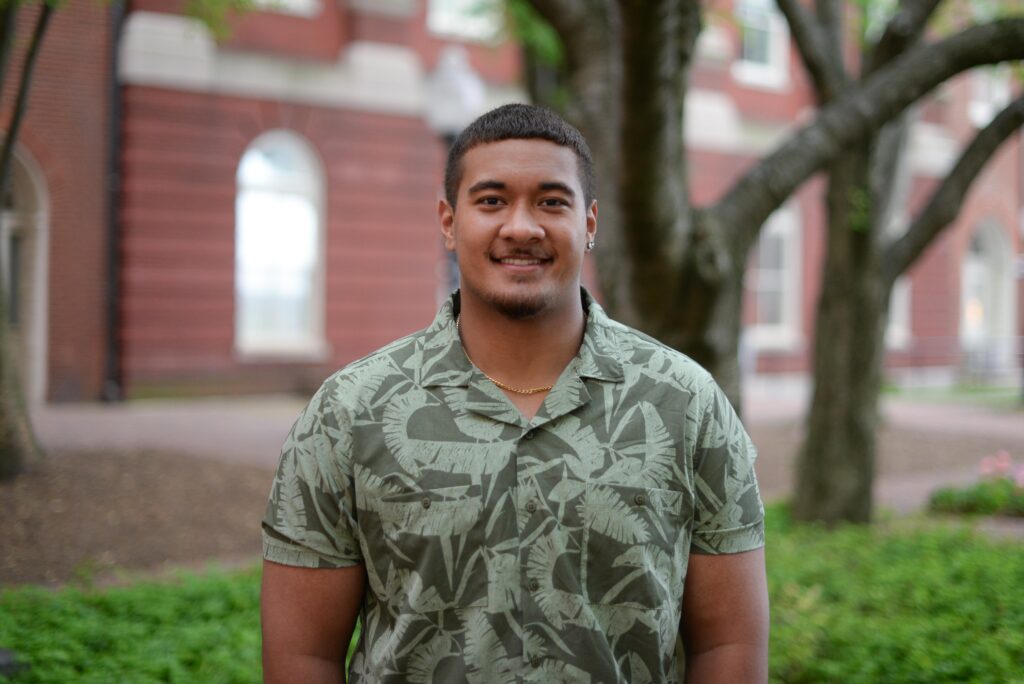
Sam Telesa received the Louis McCahill Award, given to the student of the graduating class who has “shown perseverance and determination of a high order in pursuing his or her educational objectives at Georgetown.”
Telesa is a student-athlete and anthropology major who balanced his time between the classroom, the weight room and the gridiron. Born in American Samoa and raised in Hawaii, Telesa was able to connect his coursework in anthropology with his own family’s history, dissecting the complex relationship between colonialism and academia.
Telesa is part of the Baker Scholars Program, a highly-selective and prestigious program open to students in the College of Arts & Sciences who possess a demonstrated interest in business and have strong records of academic achievement, community service and leadership.
Professors and coaches alike have noted Telesa’s natural leadership ability. Telesa served as co-president of the Georgetown University Christian Athletes organization and led weekly chapel services for the football team.
Alongside a demanding academic and athletic schedule, Telesa worked several jobs, as a curriculum assistant for the Georgetown Scholars Program, a site coordinator for the Washington National Youth Baseball Academy and a field engineer intern for a local construction company. After graduating, Telesa will pursue a graduate degree and play football at the University of New Mexico.
The McCahill Award was established in 1960 by Mr. Eugene McCahill and Mr. Francis McCahill in memory of their brother, Louis, who died in the service of his country in the First World War.
Amira Ali
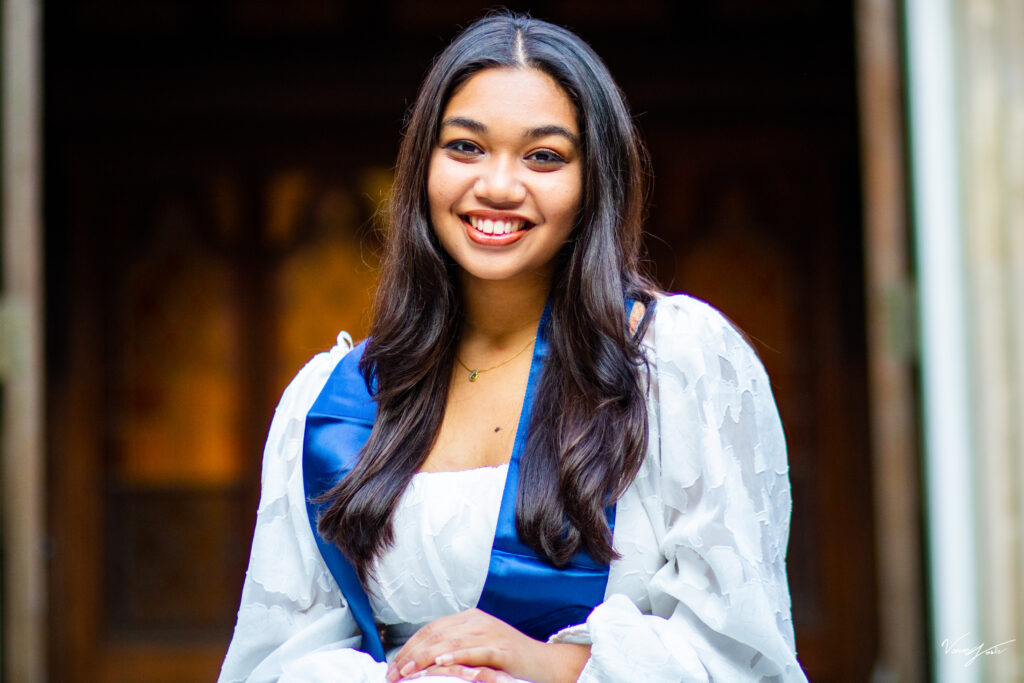
Amira Ali delivered the Cohonguroton Address at the invitation of the dean, Rosario Ceballo. Taking its name from the Algonquin word for the Potomac River, the Cohongurton Address is delivered by one of the graduating class’s most outstanding students.
Ali, a double major in psychology and government, has been active inside the classroom and around campus during her time at Georgetown. While on the Hilltop, Ali co-founded Guzaarish, a competitive Bollywood fusion dance team that has traveled to five competitions across the country and was invited to perform at Vice President Kamala Harris’ Diwali party. Ali also served as president of the GU Moot Court Team and co-student director of the Georgetown Chapel Choir.
In her remarks, Ali highlighted the names of Georgetown’s unsung heroes, including Washington Walker, a GUTS bus diver; Mo Ogbes, a security guard at Lauinger Library and Lindbergh Barrett, a member of the facilities team for the Village C residence hall.
“That’s the beauty of this campus community – in the ICC, in the VCW lobby, at the Lau 2 tables at 3 am, I have found more love in the corners of this university than anywhere else,” said Ali. “And that’s why Mo, Washington and Lindbergh matter so much: They care for and from the corners.”
Ali encouraged the gathered graduating students to make the most of their education by shaping the world around them with the tools they’ve acquired at Georgetown.
“At Georgetown, we were taught how to grapple with the challenges of our generation – to see innovative solutions, to see things deeply, to see what could be rather than what is,” said Ali. “Georgetown gave us the space to experiment to this end, to imagine our future free from the confines of what is strictly practical, to imagine all that is possible.”
After graduating, Ali will work as a national security paralegal for Morrison & Foerster, a legal practice located in Washington, DC.
Marc Howard
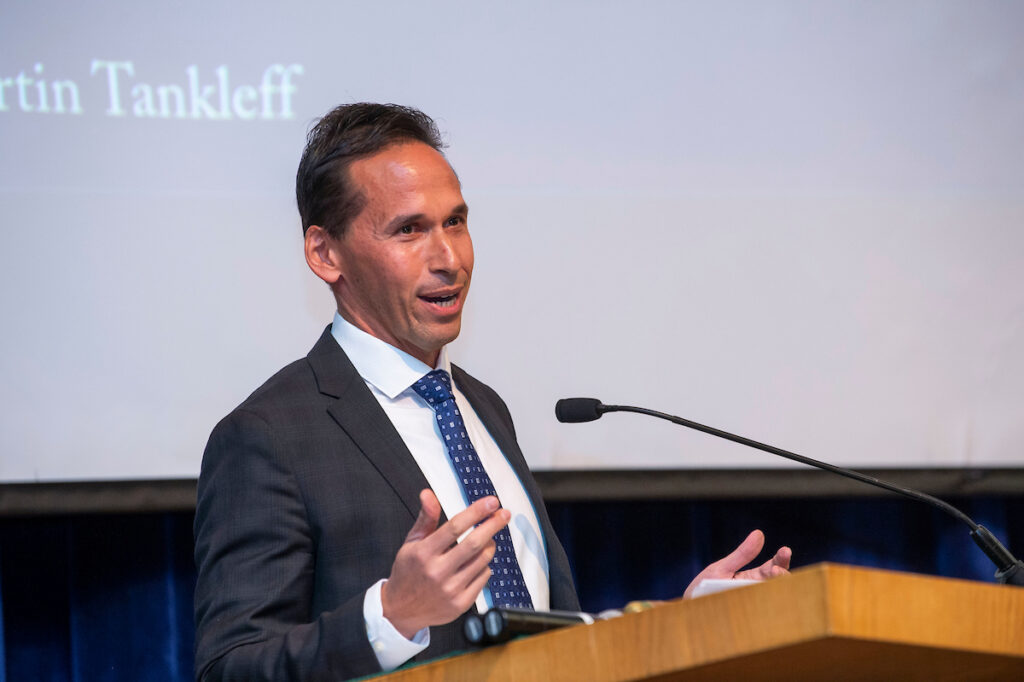
Marc Howard, a professor in the Department of Government, received the Bunn Award for Faculty Excellence. Arlando “Tray Jones III, a program associate in the Prisons and Justice Initiative (PJI) accepted the award on Howard’s behalf and delivered remarks.
Established in 1967 to honor Rev. Edward B. Bunn, S.J., the award is chosen by a vote of the senior class and presented to the member of the College faculty who “is admired and respected by all students for their service to Georgetown in the classroom and on the campus community.”
Howard is the founding director of the PJI, which houses a slew of programs aimed at addressing the mass incarceration crisis. Within the PJI, Howard teaches the popular Making an Exoneree course, in which students investigate likely wrongful convictions and produce short documentary films highlighting those cases. To date, five exonerees, including Jones, whose stories have been told through the class have either been exonerated or released.
In addition to the Making an Exoneree course on campus, the PJI has an impact off the Hilltop. The PJI’s Prison Scholars Program gives incarcerated individuals in Washington, DC and Maryland the opportunity to take classes while in prison and eventually earn a degree from the College of Arts & Sciences. Their Paralegal Program, in partnership with the Mayor’s Office of Returning Citizen Affairs and the DC Department of Employment Services, gives returning citizens a path to a paralegal career. And the Pivot Program awards a non-credit-bearing certificate in business and entrepreneurship to formerly incarcerated individuals, which is awarded on the basis of both academic work and supported employment.
To view the program for the Tropaia Exercises and review the full list of awardees, click here.
-by Hayden Frye (C’17)
